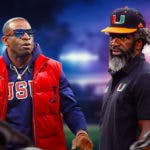Ryan Ridder is the head coach of the Bethune-Cookman Wildcats, but casual fans most likely know him as the baby-faced guy in the MEAC who is only starting his career. It's a fairly accurate summation of Ridder, who is only 33-years-old, yet it's void of everything else he has already brought to the table.
It's relentless battles with people doubting because of his youth, then grinding away on the sometimes lifeless recruiting trail. Not to mention previous successes he's had at lower levels of college basketball being ignored for lazy narratives.
Prior to becoming the head coach of the Bethune-Cookman Wildcats, Ridder manned the helm for Daytona College. Operating within the NJCAA, he led the program to an overall record of 95-28 (28-8 in Mid-Florida Conference play), helping the Falcons win the league title all four years he was there.
Going back in time even more, you realize Ridder's journey to become the head coach of a Division I program is nearly as odd as it was quick. Having never played Division I hoops, but becoming a legend of sorts in the Dayton Beach area thanks to his exploits at Embry–Riddle as both a player and assistant, his story is relatively remarkable.
Unfortunately for Ridder, coaching wasn't his original plan. Like many other kids growing up, he wanted to be the next NBA superstar.
“I wanted to play as long as I could,” Ryan Ridder told me. “But it became clear pretty quickly that it wasn't going to last that long.”
33-year-old guys just aren't supposed to be Division I head coaches. More specifically, guys Ridder's age, who enter the college basketball world without all the hoopla that can come with starring for a blue-blood program, are usually meant to pay years and years of dues before getting a crack at manning the helm.
“I think it's really humbling,” Ridder said. “There's a lot of qualified guys and a lot of great people in our profession that just don't get the chance to be a head coach. I didn't know if I'd ever get there, especially at this age, but I'm very fortune.”
“I work hard. I wake up and I don't take this for granted. The route has been unique, sure, and not exactly how I envisioned it, but it's really humbling to wake up each day to live out your dream.”
It's where his father is the head coach Ridder ended up earning a degree in Aerospace Studies in 2008. It's also the earnest starting point for him to chase his aforementioned dream.
“Embry-Riddle is very well known for its aviation and engineering,” Ridder said. “I transferred there because I knew I wanted to coach, but at the time, they didn't have liberal studies or a coaching track, so Aerospace Studies was one that combined physiology and business classes.”
“Ultimately, it sounds like I'd know a lot about aviation, but but it was more about interdisciplinary studies.”
Ridder would go on to coach at North Raleigh Christian for a season before returning to do the same for his father at the famed aeronautical university. A season after that, he'd go be an assistant for the Campbell Fighting Camels, his first brush with Division I basketball.
His pedigree is what attracted Bethune-Cookman to Ridder. He's an unconventional hire by a program absent of an NCAA Tournament appearance in its history. A university with over 300 more losses than wins at the Division I level. The weighing of a risk-reward situation in bringing a comparatively dangerous hire was likely a discussion had, though the attractiveness of taking on a creative, outside-the-box head coach clearly won out.
The Bethune-Cookman Wildcats have been winning ever since.
Gravelle Craig gave the Wildcats their last winning season in 2011-12, finishing with a record of 18-17. In Ridder's first campaign, with the previous tenure only mustering 10 wins the year prior, he led Bethune-Cookman to a record of 18-14, tied for the regular season crown in the MEAC.
Falling short in the league tournament, failing to earn their first ever Big Dance slippers, there's still more reason for optimism than negativity for the Ryan Ridder era of Bethune-Cookman hoops. Some of that rests in his tireless work ethic — he was in Orlando recruiting during our interview — and plenty of it has to do with the style of play he implements.
“It obviously depends on the roster we have, but my philosophy is dunks in transition and threes,” Ridder said when asked about his coaching style.
He would go on to say that he has a foundation set, but will use all the tools available at his disposal and adjust to his team when needed. A few thoughts that might not sound like a big deal, but certainly are to the players Ridder is attempting to recruit. After all, as much as they might want to play for a specific school or coach, players need to concern themselves with fit.
Ridder is fluid, never fully molded. Willing to adjust to those around him to reach whatever full potential awaits.
For Ridder, as we get to witness the infancy of his voyage through the coaching ranks from the outside, basketball is just the start of it all.
“It goes beyond a few years of basketball,” said Ridder. “It's about lifelong friendships and mentorships. It's about becoming a family.”
–
Editor's note: This story originally ran on a now defunct website (8-02-18) which the author owned.
Joseph Nardone has been covering college basketball for nearly a decade for various outlets in a variety of ways. You can follow him on Twitter @JosephNardone.


